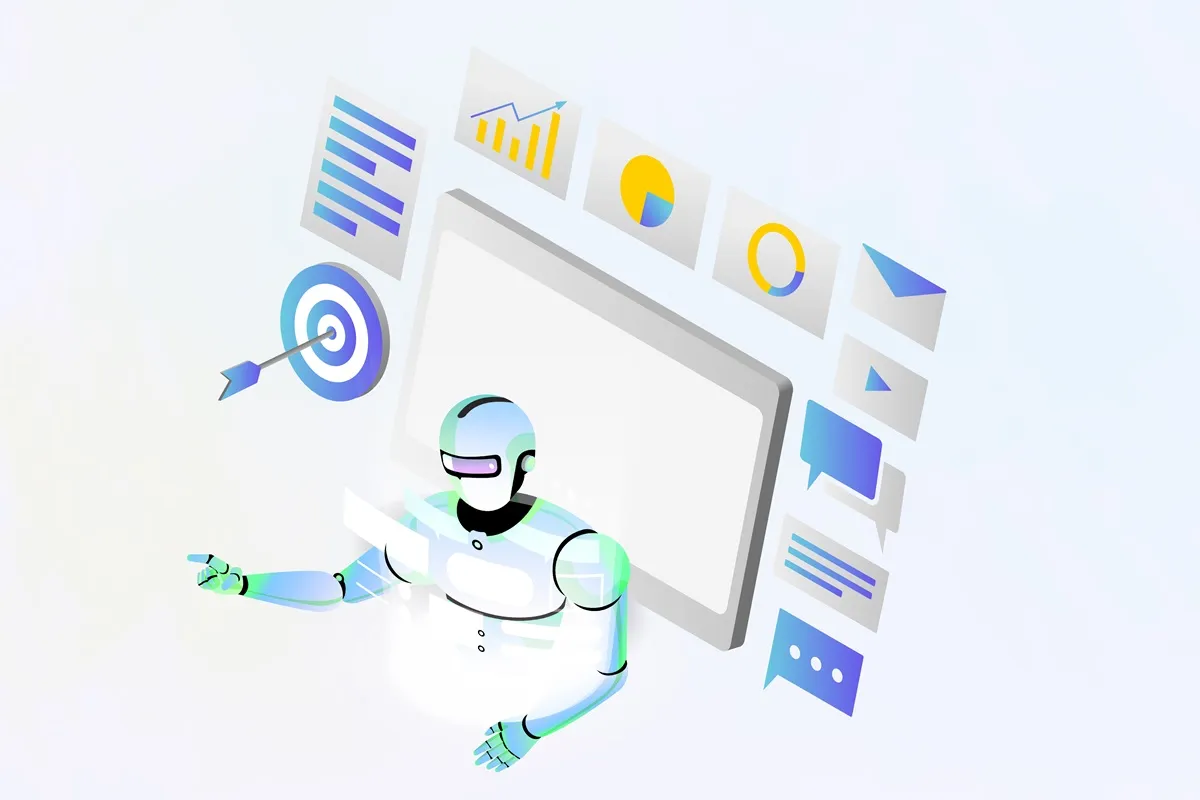Artificial intelligence (AI) is reshaping the marketing landscape, offering both immense potential and potential pitfalls. On one hand, AI empowers marketers with powerful tools to automate tasks, analyze vast datasets, and deliver highly personalized experiences. It can predict customer behavior, optimize campaigns, and generate creative content at scale.
On the other hand, the rapid advancement of AI raises concerns about data privacy, ethical implications, and the potential for job displacement.
As AI continues to evolve, marketers must navigate this double-edged sword, harnessing its benefits while mitigating its risks.
Trending AI Applications in Marketing
Artificial Intelligence (AI) has become an essential tool in marketing, enabling businesses to create more targeted campaigns, improve customer engagement, and gain deeper insights into consumer behavior.
Below are some of the most impactful AI applications in marketing today.
Hyper-Personalization
Hyper-personalization takes marketing to the next level by leveraging advanced AI, machine learning, and real-time data to deliver highly tailored experiences to individual customers.
Unlike traditional personalization, which might use basic demographic information like age or location, hyper-personalization analyzes behavioral data, browsing history, purchasing patterns, and even real-time actions to create deeply customized interactions.
Hyper-personalization involves integrating data from various touchpoints—such as website visits, app interactions, email engagement, and social media activity—and using AI to draw meaningful insights. These insights help brands predict customer needs and deliver content, offers, or recommendations that are not only relevant but also timely.
AI-Powered Content Creation
AI-powered content creation allows marketers to produce high-quality, personalized, and engaging content with greater efficiency.
Tools like ChatGPT and Jasper AI analyze audience preferences, industry trends, and historical data to generate everything from blog posts to social media updates.
These AI platforms go beyond writing; they optimize content for search engines by incorporating relevant keywords, crafting attention-grabbing headlines, and structuring articles to improve readability and ranking.
For marketers, this means they can scale their content strategies without significantly increasing costs or time investment. Personalized content creation also ensures that messaging aligns with specific audience needs, leading to higher engagement and conversion rates.
For example, an AI tool can create email campaigns tailored to different customer segments, boosting open and click-through rates.
Predictive Analytics
Predictive analytics uses AI and machine learning to analyze historical data and predict future trends, customer behaviors, and campaign outcomes.
This capability enables marketers to make data-driven decisions and fine-tune their strategies for maximum impact. By identifying patterns in customer purchasing habits, marketers can anticipate what products or services will be in demand and allocate resources accordingly.
For instance, a subscription service might use predictive analytics to determine which customers are at risk of canceling and proactively offer them incentives to stay. Similarly, an online retailer can predict which items will sell well during a specific season, ensuring sufficient stock and targeted promotions.
Predictive analytics not only improves campaign efficiency but also enhances customer satisfaction by delivering more relevant and timely offers.
Chatbots and Virtual Assistants
Chatbots and virtual assistants have revolutionized how businesses interact with customers. Powered by Natural Language Processing (NLP), these AI tools can handle customer queries, provide recommendations, and guide users through purchasing processes in real-time. Available 24/7, chatbots eliminate the need for customers to wait for human assistance, ensuring a seamless user experience.
For example, an e-commerce chatbot can help customers find products, check stock availability, and even process payments, all through a conversational interface.
Virtual assistants take this a step further by integrating with voice-activated systems like Alexa or Google Assistant, offering hands-free interactions. These tools not only improve customer satisfaction but also reduce operational costs by automating routine tasks.
Social Media Listening and Sentiment Analysis
AI-driven social media listening tools monitor conversations, hashtags, and mentions across platforms to gauge public sentiment toward a brand, product, or topic.
Sentiment analysis algorithms classify these interactions as positive, negative, or neutral, providing valuable insights into how a brand is perceived in real-time.
This information allows marketers to respond quickly to negative feedback, address potential crises, and adapt their strategies to align with audience sentiment.
For instance, during a product launch, sentiment analysis can help identify areas of concern or features that customers love, enabling companies to refine their messaging and product offerings.
Additionally, competitive analysis through social listening helps marketers identify gaps in the market and capitalize on trends before their competitors.
How Companies and Individuals are Leveraging AI
Artificial Intelligence (AI) is no longer just a futuristic concept; it’s a powerful tool being used every day by businesses and individuals to improve efficiency, make smarter decisions, and achieve better results.
Here’s how AI is being applied in real-world scenarios by e-commerce giants, marketing agencies, and individual marketers.
E-commerce Giants
E-commerce companies like Amazon, Alibaba, and Shopify rely heavily on AI to enhance their customer experiences and streamline their operations.
- Personalized Shopping Experiences: AI algorithms analyze customer behavior, such as browsing history and purchase patterns, to recommend products that a shopper is likely to buy. For example, when you shop on Amazon, the “customers who bought this also bought” section is powered by AI.
- Dynamic Pricing: E-commerce platforms use AI to adjust prices in real-time based on demand, competition, and inventory levels. This ensures that products remain competitive while maximizing profits.
- Efficient Inventory Management: AI helps predict which products are likely to sell fast and when restocking is needed. This reduces overstocking or running out of popular items.
- Chatbots for Customer Support: AI-powered chatbots provide instant assistance to customers by answering queries, tracking orders, and offering product recommendations 24/7.
These applications make online shopping faster, easier, and more enjoyable for customers while helping companies save costs and improve sales.
Marketing Agencies
Marketing agencies are using AI to deliver better results for their clients by making campaigns smarter, more efficient, and more targeted.
- Campaign Optimization: AI tools analyze data from past campaigns to identify what works and what doesn’t. Agencies use this insight to create high-performing strategies for future campaigns.
- Content Creation: Tools like ChatGPT and Jasper AI help agencies generate blog posts, ad copy, social media captions, and email campaigns faster. AI ensures the content is engaging and tailored to specific audiences.
- Audience Targeting: AI analyzes customer data to help agencies identify their ideal audience. For example, AI can determine which age groups, interests, or locations are most likely to respond to a campaign.
- Performance Tracking: Agencies use AI to monitor campaign results in real-time. If a strategy isn’t performing well, AI tools can suggest adjustments, such as changing ad copy or targeting different audiences.
- Social Media Scheduling and Management: AI-powered tools like Hootsuite and Buffer analyze the best times to post content and provide suggestions for hashtags or trends to increase engagement.
With AI, agencies can deliver more effective marketing strategies with less guesswork, giving their clients better results.
Individual Marketers
Even individual marketers and freelancers are leveraging AI to simplify their work and enhance their output, making it easier for them to compete with larger teams.
- Content Writing: AI tools help marketers create high-quality articles, social media posts, and email newsletters quickly. This saves time and ensures consistency in tone and messaging.
- SEO Optimization: Tools like SEMrush or Ahrefs use AI to analyze keywords, backlinks, and search trends, helping individual marketers improve their website rankings and drive traffic.
- Graphic Design and Visuals: AI tools like Canva and Adobe Sensei make designing professional graphics easy for marketers with limited design experience.
- Email Marketing Automation: AI platforms like Mailchimp and ActiveCampaign automate email sequences, segment audiences, and personalize messages for higher engagement.
- Social Media Management: Freelancers use AI tools to schedule posts, monitor engagement, and analyze performance metrics, allowing them to manage multiple accounts efficiently.
- Learning and Skill Development: AI-powered platforms like Coursera and Udemy recommend courses and learning paths to individual marketers, helping them keep up with industry trends and improve their skills.
The Downside of AI in Marketing
While Artificial Intelligence (AI) offers incredible benefits for marketing, it’s not without its challenges. Here are some common drawbacks businesses and individuals face when using AI in marketing.
Data Privacy Concerns
AI relies on collecting and analyzing large amounts of customer data to deliver personalized experiences. While this can improve marketing, it raises concerns about how that data is collected, stored, and used.
If companies aren’t transparent or fail to secure data properly, it can lead to privacy violations and even legal issues.
Tailored to Your Needs: How Custom Ecommerce Development Can Solve Your Business Challenges
For example, customers may feel uncomfortable if they realize their online activities are being tracked in ways they didn’t expect.
Ethical Implications
AI in marketing can sometimes push ethical boundaries. For instance, hyper-personalized ads might feel invasive to some users, and targeting vulnerable audiences—such as those experiencing financial hardships—with certain ads can appear exploitative.
Marketers must balance using AI to maximize profits with ensuring they respect customer values and boundaries.
Job Displacement
As AI tools automate tasks like content creation, customer service, and campaign management, there’s a fear that human jobs might be replaced.
For example, chatbots can handle a large volume of customer queries, reducing the need for customer service agents. While AI creates new opportunities, it also requires workers to upskill or transition to new roles, which can be challenging.
Overreliance on Technology
Depending too much on AI can lead to problems if the technology fails or produces inaccurate results.
For example, if an AI tool misinterprets data or makes incorrect recommendations, it could harm a marketing campaign. Additionally, overreliance on AI might reduce creativity and human input, which are still crucial for effective marketing.
Lack of Transparency
AI algorithms often work as “black boxes,” meaning it’s not always clear how they arrive at certain decisions.
For example, if an AI system chooses one customer group over another for targeted ads, marketers might not fully understand why. This lack of transparency can make it hard for businesses to justify decisions to customers or regulators.
Bottom Line
AI has the potential to transform marketing, but it is essential to use it responsibly and ethically. By understanding the limitations and potential pitfalls, marketers can harness the power of AI to drive growth and innovation while mitigating risks.
It’s crucial to strike a balance between human creativity and technological advancements to deliver truly impactful marketing campaigns.



